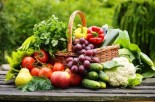Why is this important?
Inflammation is the root cause of a number of health issues, including pain.
Before you reach for that OTC pain reliever, you may want to take a look at your diet.
For instance, if you sit down to a quick meal of a fast food burger and French fries, the inflammation in your body will be heightened for the next 8-12 hours. On the other hand, if you eat a clean, balanced meal with lots of leafy green veggies, your inflammation is reduced.
What are the main foods you should be eating to reduce inflammation, and thus reduce pain?
At the top of the list, according to Dr. Heather Tick, should be vegetables.
Vegetables contain a ton of nutrients with not a ton of calories. They have minerals, vitamins, enzymes, some protein, good fats and a lot of antioxidants. Antioxidants quench the fire of inflammation, including pain-related inflammation.
Vegetables also make your body less acidic. This is important because acid causes more wear and tear on your body.
Potatoes and corn shouldn't be included in your anti-inflammatory vegetable intake, as they fall more into the starch category than true vegetables. Instead, choose lots of colorful veggies in red, green, purple, orange, and yellow.
Some fruit is OK, but it should not be the majority of your "produce" intake because of the high sugar content. Berries can be one exception, as they are full of antioxidants and could be eaten all year round.
If you must do fruit, seasonal fruits are a nice choice, for a few reasons. One, if they're seasonal, you won't eat as many servings. Two, they haven't been shipped as far, which is good for both your body and the environment. And, finally, some research has shown that eating seasonal fruits actually sends a message to your body and brain, changing up your metabolism based on what season it is.
Stay away from fruit juices, especially pre-packaged fruit juices.
Two more of Dr. Tick's favorites include turmeric and ginger. These work to reduce inflammation and pain, oftentimes just as effectively as traditional pain relievers.
How long will it take to see some results?
Dr. Tick says it all depends on your starting point. If you have a very acidic body that's been depleted of nutrients, it will take longer for you to realize results.
In general, some difference can be seen in two weeks.
Finally, while dietary supplements have become quite popular, Dr. Tick says food should always come first.
In the accompanying audio segment, Dr. Heather Tick shares information about anti-inflammatory foods, why inflammation is so bad for you, and why she became so interested in using food to fight inflammatory diseases and conditions.
Potatoes and corn shouldn't be included in your anti-inflammatory vegetable intake, as they fall more into the starch category than true vegetables. Instead, choose lots of colorful veggies in red, green, purple, orange, and yellow.
Some fruit is OK, but it should not be the majority of your "produce" intake because of the high sugar content. Berries can be one exception, as they are full of antioxidants and could be eaten all year round.
If you must do fruit, seasonal fruits are a nice choice, for a few reasons. One, if they're seasonal, you won't eat as many servings. Two, they haven't been shipped as far, which is good for both your body and the environment. And, finally, some research has shown that eating seasonal fruits actually sends a message to your body and brain, changing up your metabolism based on what season it is.
Stay away from fruit juices, especially pre-packaged fruit juices.
Two more of Dr. Tick's favorites include turmeric and ginger. These work to reduce inflammation and pain, oftentimes just as effectively as traditional pain relievers.
How long will it take to see some results?
Dr. Tick says it all depends on your starting point. If you have a very acidic body that's been depleted of nutrients, it will take longer for you to realize results.
In general, some difference can be seen in two weeks.
Finally, while dietary supplements have become quite popular, Dr. Tick says food should always come first.
In the accompanying audio segment, Dr. Heather Tick shares information about anti-inflammatory foods, why inflammation is so bad for you, and why she became so interested in using food to fight inflammatory diseases and conditions.

 Using both the data of modern science and the time-proven traditions of complementary medicine, Dr. Heather Tick, M.D., has helped tens of thousands of patients reach their peak levels of health. For over 20 years, Dr. Tick has dedicated herself to researching evidence-based holistic treatments for pain and inflammation. A multiple-book author, including the highly acclaimed Holistic Pain Relief: An In-Depth Guide to Managing Chronic Pain, Dr. Tick empowers her patients to live free of pain and full of life.
Using both the data of modern science and the time-proven traditions of complementary medicine, Dr. Heather Tick, M.D., has helped tens of thousands of patients reach their peak levels of health. For over 20 years, Dr. Tick has dedicated herself to researching evidence-based holistic treatments for pain and inflammation. A multiple-book author, including the highly acclaimed Holistic Pain Relief: An In-Depth Guide to Managing Chronic Pain, Dr. Tick empowers her patients to live free of pain and full of life.